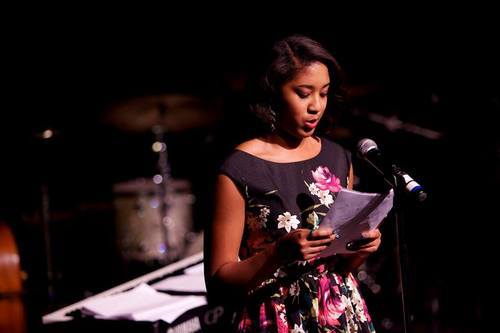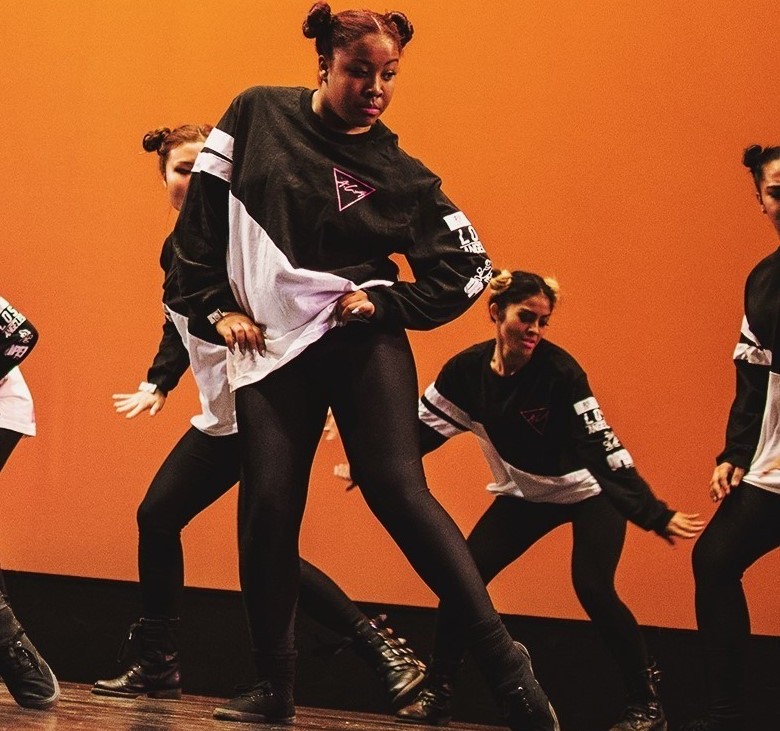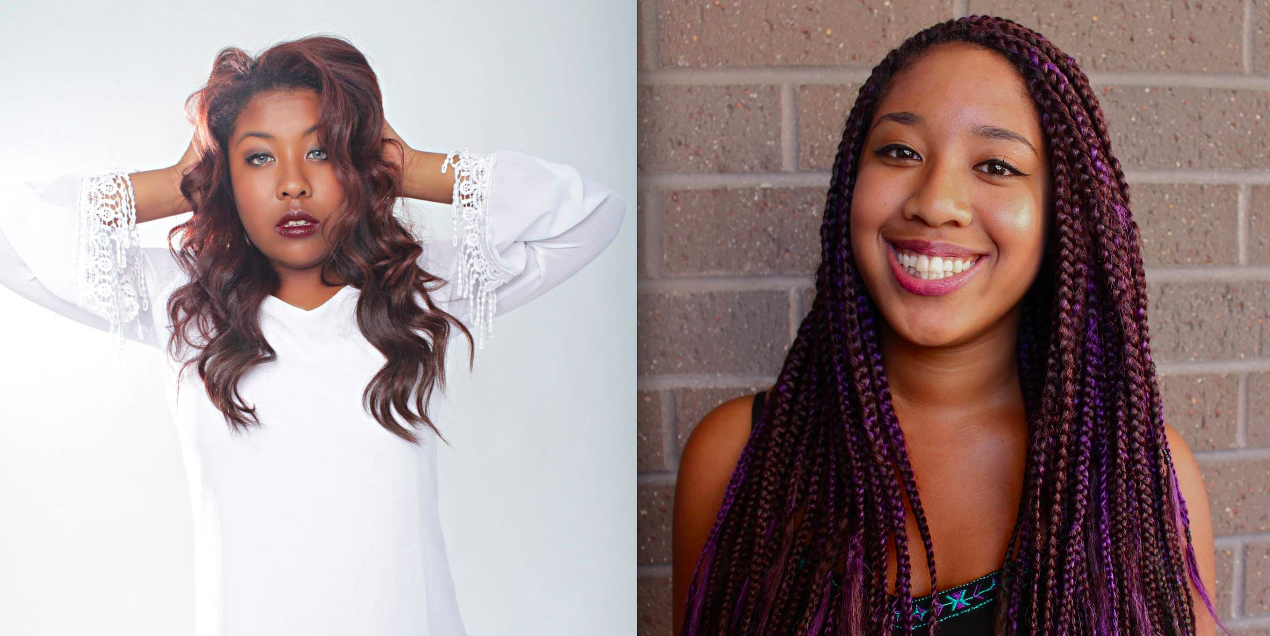A Conversation with the Moulton Sisters
Image: Courtesy of Danyel and Kadija Moulton.
In light of their first collaboration together, I talked with Danyel Moulton, a second year Dance Major at UCLA and her younger sister Kadija Moulton, who is set to graduate from Orange County School of the Arts (OCSA) in the high school’s Creative Writing program. Their video piece “To Whom It May Concern” has amassed over a thousand views on Youtube, and has been both praised and celebrated by their peers throughout the SoCal area.
When I watched their video for the first time, I was not only astonished once again by their individual talents as a dancer and a poet, but I was extremely impressed with the apparent support Danyel and Kadija have for each other. I wondered if it was a declaration for Kadija as much as it was a tribute to Danyel. While the piece ends with a literal reference to Danyel’s major, I could not help but notice the profound context that Kadija’s words contain for herself at the moment. She is, after all, about to graduate high school and I’m sure these “numbers” discussed in the piece can take a significant toll on an intelligent young woman applying to college. While interviewing them, I found some interesting insights in their creative process that was involved in the creation of this piece. What sorts of struggles inspired this piece, specifically as young female artists of color?
DM: “Honestly, I’ve wanted to work with my sister since high school. I guess college has been really rough for me and I always talk to her about it. So I feel like even though we’re farther apart we’ve gotten closer since I’ve left because we talk a lot more. I think it was like a month ago like one of my friends started some stupid ass shit. But the whole thing wasn’t about him, he just sparked the whole fire.
A lot of people don’t realize that being a dance major is fucking hard. Like especially physically, there’s no break. It’s just little jabs like these kind of piled up. It would be little things, like I could be studying with some people and someone is like: “Oh you can just go home because you’re a dance major you don’t have to study.” It’s like I’m not playing around, this is definitely what I want to do. And I told my sister I was like “I’m done. I can’t.”
KM: This piece is absolutely a tribute to Danny. Of course there are certain elements that I can identify with myself, and I think to a certain extent everyone can, but this one was definitely meant for her. It’s bits and pieces of conversations we’ve had where she’s really shared her heart and her honesty with me. The pain of having people overlook her because of who she is, and mostly because she’s a dance major really got me. I wanted this piece to be empowering for her, to sort of declare and share how extraordinary she is with the world. I wanted everyone to see what I’ve always seen. As far as the “they” in this poem goes, it’s less of one concrete person talking than a mantra that gets passed around about almost anything in life. The problematic figure in the poem required a little dancing around on my part, since I wanted this poem to be kind of a fill in the blank situation for the audience. I knew there could be some people in Danny’s life that would watch this piece and think, “Is this about me?” I wanted those people to hang out in that headspace and really think about the stuff they’ve done to even merit the possibility that the problematic figure could be them. Relating that to the higher education system just felt right in the context of value.
In college (from what I’ve gathered) it’s very much an intersection of how one values themself, how others value them, and how much that person lets the higher education system weigh on those two values. It’s kind of a war.
DM: I would say that yeah the poem was kind of geared towards me but there were little sprinkles of what Kadija’s been feeling about college. I kind of want her to learn from what I’ve done. But I also want her to know that it’s not all bad. I mean college is about experience. [So] I kind of base my movement with her in mind so I kind of base my movement off of not necessarily being angry. I kind of base my movement more on like “This is my situation. I’m learning from it.” Especially the last part, originally I wanted to flip off the camera, I really wanted to. But I thought about it and I was like:
- This is going on YouTube.
- My sister still has college apps to do and I definitely want her to put this up and I want her to be able to showcase this to people and for her to be able to put this video as a video of recommendation for colleges.
So I really thought of Kadija when I was creating it. Cause there’s a lot of things I could have done artistically that would have been a little bit more vulgar and a little bit more aggressive but neither of us wanted to send an aggressive message. We kind of wanted to throw shade…like low-key. We kind of throw shade like that all the time.
KM: The title really came together after the poem itself was finished. Writing the piece really brought up emotions that I haven’t really experienced while writing poetry, and I think that’s because it was based off of Danny’s experiences. I’ve always been protective of my sister, but the kind of pain in her stories was raw and it was real, and soon it dawned on me that she had to go through those heartbreaks and let downs alone. That really frustrated me. No one deserves to feel small, and certainly not someone that can dance like she can. I wanted the specificity of the figure at the beginning to be up to the audience. I wanted them to ask themselves whether or not they could fit the mold and if so, they have some thinking to do…
DM: I would say growing up as an artist, as a female artist, has been really hard because like everything we do, people think that we have a message or people think that we have to get something across. They think we have to prove ourselves in a way. And even though I feel like, yeah, this does have a message, I’m not trying to prove to anyone that I can dance. And I’m not trying to prove that, you know I can do this and I’m capable of this like I KNOW I’m capable of it. And that’s something that I guess I struggle with because I felt that I had to prove myself a lot last year. With the dance team I was on, and being in the dance major, keeping up with all my peers and their GE’s, I felt like I had to prove myself. A lot of the time since I was a girl, I would feel like sometimes people would just kind of be like “you know what it’s okay if you can’t because you have this barrier…that you can’t change” and that pissed me off. And I’ve been reading a lot of stuff about Black Bruins, and everything that’s been happening and it makes me really really sad. It really does. There are nights when I read articles and I legit cry not because I’m Black but because people see Black people that way. And it’s ridiculous. That’s something I think about when I dance.
KM: In a time where women writers of color are fighting just to get their voices and their stories heard, it can be a bit discouraging when trying to create something new. Artistically, I think it’s all about perspective. I might not get the mainstream celebration of my voice but it’s never really been about that for me, and I don’t think it’s been about that for any of the women of color making art in spite of the exclusion.
We might all be screaming into the wind, but at least we can join together and make some damn good noise while we’re here.
DM: I guess it’s something that I don’t think I can necessarily overcome because it’s so much bigger than I am, but I think it’s definitely something that I can be conscious about and maybe make other people conscious with my dance. Cause that’s what I want to do. There was a point last year where I wanted to quit dance cause I don’t know what I’m in it for I’m just doing it and it’s taking a toll on my body. Especially after this project I wanted to send a message when I dance and I think that’s the reason why I dance to make people feel something if it’s happy, sad, concerned I don’t know what it is but I want to make someone feel something when I dance. If I’m performing, filming a video, if I’m at practice, even if I’m by myself I can at least make myself feel something. And all this positive feedback I’ve been getting, it’s kind of like a reassurance that like okay well you can do it. Like I’m excited that it went well because this was kind of an indicator of whether I should pursue it or not. So I think this is a green light.
KM: I think it’s very important for young writers like myself to keep on writing and sharing their creations with the world. You can learn forms and tropes and all the bells and whistles of writing as you get older but the creativity that compels you to write has been there since day one. I used to have the mentality that I’m too young to create pieces that I’ll still be proud of in the years to come. But then I realized, if I don’t write now, if I don’t share my voice the way it is right at this moment, what will I have to look back on?
Danyel and Kadija are in talks about possible new collaborations with each other, in addition to their busy schedules. They are particularly interested in making a piece regarding issues based on race.
Kadija is making waves both as a spoken word artist and as a screenwriter.

She was recently selected to attend the Austin Film Festival for her screenplay Nate Lancaster’s Day Off.
Danyel continues to leave the skeptics awestruck and silenced just in case they have ever doubted her studies as a dancer.

As a dancer on the ACA Hip Hop Team, she still kicks ass during practices that last until 4 AM on weekdays, constantly choreographs her own work, and just won first place with the team in the Champions Bridge Dance Competition.





